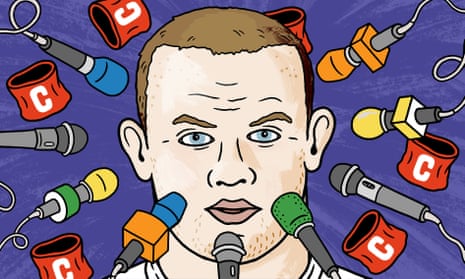Don’t kill Wayne Rooney. You need Wayne Rooney. These were the last and also the most interesting words spoken by Sven-Goran Eriksson during his time as England manager, a period of almost-success that came flooding back this week with the news the Fake Sheikh Mazher Mahmood has been convicted of perverting the course of justice.
Mahmood was the sting artist who plied Sven with £900 champagne on a hired yacht in 2006 to get him to say he wouldn’t mind managing Aston Villa and maybe David Beckham could be persuaded to come too. Yeah. I could do that. Beckham. Cheers. Later, after some more £900 champagne, Eriksson also confirmed he once threw a kettle over a pub, that his thumbs look really weird – don’t they look weird? – that he really loves this song and this is undoubtedly the best night of his life ever.
Eriksson was genuinely stung by his brush with “that stinking rag”, as he calls the News Of The World in his book Sven. The most notable thing about Sven is its very tangible sense of melancholy, a lament that feels oddly stark and Nordic. It closes with a passage about Sven riding his bicycle through the crowds in China, surrounded by opacity, regrets, ghosts, indifference: “I took my bicycle and cycled along the Pearl river. Where had the years gone? My children? Friends? The women? Time? It hurt to think back.”
Death, decay, dust. Age and then the only end of age. Although, to be fair, Sven did pop up last year in the Swedish version of Hello!, living with an exotic dancer half his age in a 10-bed mansion with a private lake and spa. So there is at least that.
Plus he also said don’t kill Wayne Rooney, which was prescient if a bit back to front, given that the sense of endings has been flowing pretty much one way. On Saturday at Wembley, Rooney will play for his seventh manager in the past three and a half years. Four of these managers have been sacked by club or country. All four of those had recently made Rooney captain. The only managers to have escaped in that time are the two who dropped him. This week Gareth Southgate went down the road more travelled, announcing Rooney will be his captain against Malta. Good luck Gareth!
There is of course no direct cause and effect here. Managers are sacked. This is not Rooney’s fault. But it does seem to be his fate for now to be there when it happens, a player with a note of death about him, a footballing Doctor Manhattan: one sweep of his great gleaming irradiated blue hand and you start to wither.
Although in this case it is not so much the football that kills you. It is instead the noise, the energy drain, the fact above all that we cannot stop talking about him. Rooney will always have his goalscoring records. Beyond that the most remarkable thing about him is simply that no English footballer has ever been so widely discussed, furiously dismissed, patiently championed. Talking about Wayne: it’s a killer. It’s contagious, too. Or rather insidious, chronic, debilitating
All four of those recently departed managers have gone down talking about Wayne. “Manchester United isn’t about Wayne Rooney,” David Moyes declared shortly before he began to unravel. “We don’t speak about Wayne Rooney,” Louis van Gaal gurgled soon after he had begun to unravel. “I’m not prepared to make this the Wayne Rooney show,” Roy Hodgson insisted, twirling his walking stick, doffing his shiny topper and ushering captain Wayne out on stage again for another turn. Even Sam Allardyce ran a great furry tongue around his molars and bit the toxic pill. “It’s not for me to say where Wayne should play,” was Allardyce’s only really significant utterance as England manager, a statement that within the space of three weeks turned out to be exactly right.
The odd thing is that the truth about Rooney is pretty simple. He has had a great career. But it has been 14 years at the top now. He is not the best No10 for club or country. He is not really a midfielder, even if he is good enough to do a siren-like impersonation of one, all false urgency and floated, drifty in-out cross-field passes. He is a valuable substitute. Well done and thanks. Wayne, you have been great. Now let’s move on.
The reality is, of course, something else. The reality is overload, white noise, laughably disproportionate obsession. In part this comes from vivid, still-tantalising memories of his early youth, when he came barrelling out on to the pitch like some half-formed, pasty-faced genius level pitch invader, there to gambol his way through and spank one into the top corner before vaulting the hoardings and sprinting off out of the stadium with a pie in his hand, a brilliant, fading imprint.
Mainly, though, it comes from other things, such as decline and unhappiness and waste. In the middle of which Rooney has sat in the stocks, a piñata for English footballing grief. TV directors are to blame in part. Every muffed move, every shanked pass, it is always cut to Wayne, trigger for a Pavlovian surge of rage at that wide, blank, flat stare. The obsession with captaincy is to blame. Manchester United and England are to blame for being aristocratic, entitled teams in a state of relative decline.
Above all there is simply the absence of anyone else to take the brunt. Rooney remains the story because the real story is he’s still the story. There is a kind of sadness in this, the quiet churn of England’s flatline years. Since Rooney’s first cap, 91 players have made an England debut. More than half of those never made it to 10 caps. Twenty-one never played again. Only Danny Welbeck has reached 10 goals in the past decade. In the same period Rooney has scored 44 times. Spin it how you like but this is not Wayne’s fault. He’s not making the rest of them fail. He just keeps turning up and being all right, so-so, decent.
And really, as Sven would say, it’s just the time, the years. The fault is in our own star system, those Road Runner years when British sporting stars of all types just keep on pumping along, legs whirring out over the edge of the cliff, refusing to look down, borne aloft by an obsessive, relentless heat, the machinery of celebrity.
It will pass, as it is passing currently at United where the real value of Zlatan Ibrahimovic is simply being more famous than Wayne, allowing him to be levered up out of his seat and led off politely to a pew nearer the back of the church. With England the story remains more or less the same for now. Obsession abhors a vacuum. In time new currents of interest will open up, new frustrations. Before then we really do need to stop talking about Wayne.

